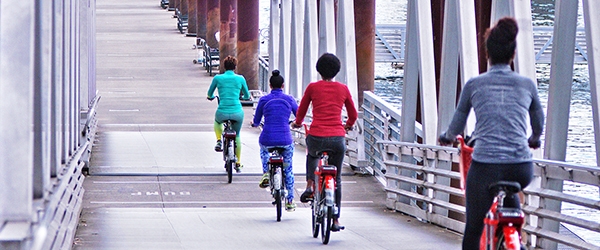Portland State University Releases Evaluation Of Bike Share Equity Programs

This week, Portland State University’s Transportation Research and Education Center (TREC) releases a new research report comparing equity-oriented programs across several U.S. bike share systems. The research finds a variety of methods in place, ranging from affordability to internal hiring practices and beyond. The report is assisted by Toole Design, and funded in part by BBSP.
DIMENSIONS OF EQUITY
In any evaluation study, it’s important to define the metrics for observation. TREC decided to look at equity in the categories of station siting and bike availability, payment, community programming, marketing, bike types, internal operations, and transit integration.
The bike share systems spotlighted include Portland’s BIKETOWN, Milwaukee’s Bublr, Pittsburgh’s Healthy Ride, Ithaca’s LimeBike, and Los Angeles’ Metro Bike Share.
The research was conducted primarily through questionnaires of bike share operators, city staff, and community partners, as well as analysis of system data. Additionally, TREC conducted individual interviews for select locations.
Nathan McNeil of Portland State University shares further:
"We set out to document the current state of equity programming for bike share systems in the U.S., and in the process create a resource that people can look to. What is the range of possible approaches? How do we begin to evaluate success and whether a bike share program has achieved their equity goals? Our hope is that this report provides a road map for cities and operators just starting to grapple with questions of equity, as well as offer fresh ideas and innovative case studies for those who have already taken the first steps in prioritizing equity in their bike share systems."
KEY FINDINGS
Researchers found that large cities were more likely to have equity measures in place (71% to 79% of them), with a significant concentration of BBSP-funded systems included. Over half of the systems with equity programs focused on individuals with lower incomes, while others targeted particular geographic areas, racial or ethnic groups, ability statuses, etc.
The report further breaks down each general program focus. For example, some specific aims within the broad goal of promoting bicycling included hosting learn-to-ride programs, increasing ridership rates, shifting perceptions of bicycling, and getting more people to try bike share systems in the first place.
Case studies provide more detailed examples, such as Memphis’ Explore Bike Share working in tandem with REI and the Downtown Memphis Commission to sponsor free rides.
MEASURING EFFECTIVENESS
Program effectiveness was rated on a scale of 1-4, with highest marks (from high to low) for hiring practices, having electric bicycles, employee training, having an income-based discount, having an adaptive cycle program, and having a cash payment program.
Areas for improvement (from low to high) included marketing campaigns, transit integration, non-English offerings, service area boundaries, and rebalancing.
However, it’s important to keep in mind that effectiveness data is a challenging metric, as various systems gather data differently, and many rely more heavily on qualitative, rather than quantitative reports.
One of the key challenges reported by the systems was funding equity-oriented programs, indicating a need for continued support.
This report will be followed in the coming months by a series of two-page briefs from TREC highlighting best practices and lessons learned in data collection, metrics, outreach methods and more. The research builds upon a previous three-part study on Breaking Barriers to Bike Share, conducted by TREC at PSU and and funded by BBSP.
The Better Bike Share Partnership is funded by The JPB Foundation as a collaborative between the City of Philadelphia, the Bicycle Coalition of Greater Philadelphia, the National Association of City Transportation Officials (NACTO) and the PeopleForBikes Foundation to build equitable and replicable bike share systems.
The Transportation Research and Education Center (TREC) at Portland State University is home to the National Institute for Transportation and Communities (NITC), the Initiative for Bicycle and Pedestrian Innovation (IBPI), and other transportation programs. TREC produces research and tools for transportation decision makers, develops K-12 curriculum to expand the diversity and capacity of the workforce, and engages students and professionals through education.
